15 Should Homework Be Banned Pros and Cons
Homework was a staple of the public and private schooling experience for many of us growing up. There were long nights spent on book reports, science projects, and all of those repetitive math sheets. In many ways, it felt like an inevitable part of the educational experience. Unless you could power through all of your assignments during your free time in class, then there was going to be time spent at home working on specific subjects.
More schools are looking at the idea of banning homework from the modern educational experience. Instead of sending work home with students each night, they are finding alternative ways to ensure that each student can understand the curriculum without involving the uncertainty of parental involvement.
Although banning homework might seem like an unorthodox process, there are legitimate advantages to consider with this effort. There are some disadvantages which some families may encounter as well.
These are the updated lists of the pros and cons of banning homework to review.

List of the Pros of Banning Homework
1. Giving homework to students does not always improve their academic outcomes. The reality of homework for the modern student is that we do not know if it is helpful to have extra work assigned to them outside of the classroom. Every study that has looked at the subject has had design flaws which causes the data collected to be questionable at best. Although there is some information to suggest that students in seventh grade and higher can benefit from limited homework, banning it for students younger than that seems to be beneficial for their learning experience.
2. Banning homework can reduce burnout issues with students. Teachers are seeing homework stress occur in the classroom more frequently today than ever before. Almost half of all high school teachers in North America have seen this issue with their students at some point during the year. About 25% of grade school teachers say that they have seen the same thing.
When students are dealing with the impact of homework on their lives, it can have a tremendously adverse impact. One of the most cited reasons for students dropping out of school is that they cannot complete their homework on time.
3. Banning homework would increase the amount of family time available to students. Homework creates a significant disruption to family relationships. Over half of all parents in North America say that they have had a significant argument with their children over homework in the past month. 1/3 of families say that homework is their primary source of struggle in the home. Not only does it reduce the amount of time that everyone has to spend together, it reduces the chances that parents have to teach their own skills and belief systems to their kids.
4. It reduces the negative impact of homework on the health of a student. Many students suffer academically when they cannot finish a homework assignment on time. Although assumptions are often made about the time management skills of the individual when this outcome occurs, the reasons why it happens is usually more complex. It may be too difficult, too boring, or there may not be enough time in the day to complete the work.
When students experience failure in this area, it can lead to severe mental health issues. Some perceive themselves as a scholarly failure, which translates to an inability to live life successfully. It can disrupt a desire to learn. There is even an increased risk of suicide for some youth because of this issue. Banning it would reduce these risks immediately.
5. Eliminating homework would allow for an established sleep cycle. The average high school student requires between 8-10 hours of sleep to function at their best the next day. Grade-school students may require an extra hour or two beyond that figure. When teachers assign homework, then it increases the risk for each individual that they will not receive the amount that they require each night.
When children do not get enough sleep, a significant rest deficit occurs which can impact their ability to pay attention in school. It can cause unintended weight gain. There may even be issues with emotional control. Banning homework would help to reduce these risks as well.
6. It increases the amount of socialization time that students receive. People who are only spending time in school and then going home to do more work are at a higher risk of experiencing loneliness and isolation. When these emotions are present, then a student is more likely to feel “down and out” mentally and physically. They lack meaningful connections with other people. These feelings are the health equivalent of smoking 15 cigarettes per day. If students are spending time on homework, then they are not spending time connecting with their family and friends.
7. It reduces the repetition that students face in the modern learning process. Most of the tasks that homework requires of students is repetitive and uninteresting. Kids love to resolve challenges on tasks that they are passionate about at that moment in their lives. Forcing them to complete the same problems repetitively as a way to “learn” core concepts can create issues with knowledge retention later in life. When you add in the fact that most lessons sent for homework must be done by themselves, banning homework will reduce the repetition that students face, allowing for a better overall outcome.
8. Home environments can be chaotic. Although some students can do homework in a quiet room without distractions, that is not the case for most kids. There are numerous events that happen at home which can pull a child’s attention away from the work that their teacher wants them to do. It isn’t just the Internet, video games, and television which are problematic either. Household chores, family issues, employment, and athletic requirements can make it a challenge to get the assigned work finished on time.
List of the Cons of Banning Homework
1. Homework allows parents to be involved with the educational process. Parents need to know what their children are learning in school. Even if they ask their children about what they are learning, the answers tend to be in generalities instead of specifics. By sending home work from the classroom, it allows parents to see and experience the work that their kids are doing when they are in school during the day. Then moms and dads can get involved with the learning process to reinforce the core concepts that were discovered by their children each day.
2. It can help parents and teachers identify learning disabilities. Many children develop a self-defense mechanism which allows them to appear like any other kid that is in their classroom. This process allows them to hide learning disabilities which may be hindering their educational progress. The presence of homework makes it possible for parents and teachers to identify this issue because kids can’t hide their struggles when they must work 1-on-1 with their parents on specific subjects. Banning homework would eliminate 50% of the opportunities to identify potential issues immediately.
3. Homework allows teachers to observe how their students understand the material. Teachers often use homework as a way to gauge how well a student is understanding the materials they are learning. Although some might point out that assignments and exams in the classroom can do the same thing, testing often requires preparation at home. It creates more anxiety and stress sometimes then even homework does. That is why banning it can be problematic for some students. Some students experience more pressure than they would during this assessment process when quizzes and tests are the only measurement of their success.
4. It teaches students how to manage their time wisely. As people grow older, they realize that time is a finite commodity. We must manage it wisely to maximize our productivity. Homework assignments are a way to encourage the development of this skill at an early age. The trick is to keep the amount of time required for the work down to a manageable level. As a general rule, students should spend about 10 minutes each school day doing homework, organizing their schedule around this need. If there are scheduling conflicts, then this process offers families a chance to create priorities.
5. Homework encourages students to be accountable for their role. Teachers are present in the classroom to offer access to information and skill-building opportunities that can improve the quality of life for each student. Administrators work to find a curriculum that will benefit the most people in an efficient way. Parents work hard to ensure their kids make it to school on time, follow healthy routines, and communicate with their school district to ensure the most effective learning opportunities possible. None of that matters if the student is not invested in the work in the first place. Homework assignments not only teach children how to work independently, but they also show them how to take responsibility for their part of the overall educational process.
6. It helps to teach important life lessons. Homework is an essential tool in the development of life lessons, such as communicating with others or comprehending something they have just read. It teaches kids how to think, solve problems, and even build an understanding for the issues that occur in our society right now. Many of the issues that lead to the idea to ban homework occur because someone in the life of a student communicated to them that this work was a waste of time. There are times in life when people need to do things that they don’t like or want to do. Homework helps a student begin to find the coping skills needed to be successful in that situation.
7. Homework allows for further research into class materials. Most classrooms offer less than 1 hour of instruction per subject during the day. For many students, that is not enough time to obtain a firm grasp on the materials being taught. Having homework assignments allows a student to perform more research, using their at-home tools to take a deeper look into the materials that would otherwise be impossible if homework was banned. That process can lead to a more significant understanding of the concepts involved, reducing anxiety levels because they have a complete grasp on the materials.
The pros and cons of banning homework is a decision that ultimately lies with each school district. Parents always have the option to pursue homeschooling or online learning if they disagree with the decisions that are made in this area. Whether you’re for more homework or want to see less of it, we can all agree on the fact that the absence of any reliable data about its usefulness makes it a challenge to know for certain which option is the best one to choose in this debate.
21 Reasons Why Homework Should Be Banned

Chris Drew (PhD)
Dr. Chris Drew is the founder of the Helpful Professor. He holds a PhD in education and has published over 20 articles in scholarly journals. He is the former editor of the Journal of Learning Development in Higher Education. [Image Descriptor: Photo of Chris]
Learn about our Editorial Process

The homework debate has strong arguments on both sides. Commonly-cited reasons why homework should be banned include the idea that it is often counterproductive, stifles students’ creativity, and limits their freedom outside the classroom.
Students already have up to 7 hours of schoolwork to complete 5 days a week; adding more contributes to increased anxiety, burnout, and overall poor performance.
But arguments for homework include the fact it does increase student grades (Cooper, Robinson & Patall, 2006), it instils discipline, and it helps to reinforce what was learned into long-term memory.
The following are common arguments for banning homework – note that this is an article written to stimulate debate points on the topic, so it only presents one perspective. For the other side of the argument, it’s worth checking out my article on the 27 pros and cons of homework .
Reasons Why Homework Should Be Banned
1. it contributes to increased anxiety.
If there’s one word that describes middle-school and high-school students, it’s anxiety. In my homework statistics article , I cite research showing that 74% of students cite homework as a source of stress.
They have so much to juggle, from the novelty of adolescence to the realization that they must soon start preparing for college and their life after (Pressman et al., 2015).
It’s a lot to manage, and adding homework that reduces their free time and makes them even more restricted is downright harmful. The natural outcome of this dogpile of pressure is anxiety, and many students often feel overwhelmed, both by the hours and hours of coursework in a day and the extensive homework they are assigned (Galloway, Conner & Pope, 2013).
Because teachers often don’t communicate with one another over curricula, major assignments can overlap such that students have to tackle numerous large projects at once, which contributes to severe anxiety over good grades.
In response to this, some students check out of school entirely, letting their academic future go to waste. While, of course, it’s not fair to strawman and say that homework is to blame for all these cases, it may indeed by a contributing factor.
2. It Offers Less Social Time
Homework cuts out free time. Children already spend the better part of their day learning in a school environment, and when they come home, they need to socialize.
Whether it’s family or friends, a social balance is important. Depending on the coursework they’re assigned, homework can detrimentally affect students’ social life, which feed back into more of our first gripe about homework: its anxiety-inducing nature.
Furthermore, social time is extremely important for children to grow up well-balanced and confident. If a child is highly intelligent (book smart) but lacks to social skills we might call street smarts , they may struggle in adulthood.
3. It Detracts from Play Time
Play is extremely important for children’s physical, social, and cognitive development . In fact, children naturally learn through play .
So, when children get home from school, they need a few hours to play. They’re actually learning when playing! If playing with friends, they’re learning social skills; but playing alone also stimulates creative and analytical thinking skills.
Play is also a different type of learning than the learning that commonly happens at school. So, allowing children to play at home gives their brain a break from ‘school learning’ and lets them learn through active and even relaxing methods.
4. It Discourages Physical Exercise and Contributes to Obesity
Exercise is an important part of life for everyone, but especially for children. Developing a positive self-image and disciplining oneself is an important skill to learn, one that becomes much more difficult when homework is in the picture.
Homework can demand a lot of attention that kids could be spending exercising or socializing. These two important life pursuits can be left by the wayside, leaving students feeling confused, depressed, and anxious about the future.
Physical exercise should be considered a key feature of a child’s holistic development. It helps keep children healthy, can reduce anxiety, and support healthy immune systems. It also helps with physical development such as supporting fine and gross motor skills .
In fact, some scholars (Ren et al., 2017) have even identified excessive homework as a contributing factor for childhood obesity.
5. It Disrupts Sleep Patterns
Everyone knows the trope of a college student staying up late to finish their homework or cram for a test.
While it would be unfair to credit homework exclusively for an unhealthy sleep schedule, the constant pressure to finish assignments on time often yields one of two results.
Students can either burn the midnight oil to make sure their homework is done, or they can check out of school entirely and ignore their academic interests. Neither is an acceptable way to live.
This point is particularly pertinent to teenagers. They are not lazy; teens need 12-13 hours of sleep every day because their bodies are changing so dramatically.
To pile additional homework on them that interferes with the circadian rhythm is not just unhelpful—it may be downright harmful (Yeo et al., 2020).
6. It Involves Less Guidance
If there’s one thing that’s beneficial about the in-person learning experience, it’s the ability to raise one’s hand and let the teacher know when something is unclear or difficult to understand.
That handheld process isn’t available for homework; in fact, homework matters little in the grand scheme of learning. It’s just busywork that’s supposed to help students consolidate their knowledge.
In reality, homework becomes something that students resent and can fill them with feelings of frustration—something that would be much more readily addressed if the same content was covered in-person with a teacher to guide the student through the assignment.
7. It’s Regularly Rote Learning
In most subjects, homework isn’t reflective of the skills students need to learn to thrive in the workforce. Instead, it often simply involves rote learning (repetition of tasks) that is not seen as the best way to learn.
A main goal of education is to train up vocational professionals with defined skills. But more often than not, homework winds up as a bland set of word problems that have no basis in the real world.
Walking through real-world examples under the guidance of a teacher is much more beneficial to student learning.
8. It Can Detract from a Love of Learning
If you know what it’s like to doze off during a boring class or meeting, then you can relate to the difficulty students have paying attention in class.
That motivation starts to dwindle when students must complete assignments on their own time, often under immense pressure.
It’s not a healthy way to inspire kids to learn about different subjects and develop a love of learning.
Students already need to sit through hours and hours of class on end in-person. This learning time should be used more effectively to eliminate the need for home.
When children finally get out of class at the end of the day, they need to socialize and exercise, not spend even longer staring at a book to complete a bunch of unhelpful practice questions.
9. It Convolutes the Subject
Another important consideration about homework is that it can often be counterproductive.
That’s because teachers don’t always use the full curriculum material for their teaching, and they may choose to develop their own homework rather than to use the resources offered by the curriculum provider.
This homework can often be off-subject, extremely niche, or unhelpful in explaining a subject that students are studying.
Students who don’t understand a subject and don’t have resources to rely on will eventually give up. That risk becomes even more prevalent when you factor in the scope, complexity, and type of assignment.
Students need to be taught in a safe environment where they can feel free to ask questions and learn at their own pace. Of course, there’s no fairytale way to perfect this ideal, but what is clear is that homework is not beneficial to the learning environment for many students.
10. It’s Not What Kids Want
Lastly, homework should be banned because it’s generally not what students want. From elementary to college level, most students harbor some sort of resentment towards homework.
It might be easy to dismiss this to say that the students “aren’t living in the real world.” The truth of the matter is that the real world is a lot more nuanced, creative, and diverse than the repetitive, broad, and often stagnant homework.
It’s easy to understand why most students wish that more time in school had been spent on learning how to live rather than trying to figure out how many apples Johnny had. Subjects like car maintenance, entrepreneurship, computer skills, socialization, networking, tax filing, finances, and survival are touched on at best and ignored at worst.
It’s not enough for students to be able to regurgitate information on a piece of paper; in the end, the education system should teach them how to be self-sufficient, something that might be much easier to do if resources were divested from homework and poured into more beneficial subject material.
Consider these 11 Additional Reasons
- Decreases time with parents – Homework may prevent parents and children from spending quality time together.
- Hidden costs – Families often feel pressure to purchase internet and other resources to help their children to complete their homework.
- Is inequitable – some children have parents to help them while others don’t. Similarly, some children have internet access to help while others don’t (see: Kralovec & Buell, 2001).
- Easy to cheat – Unsupervised homework time makes it easy for children to simply cheat on their work so they can get on with play time!
- Lack of downtime – Children need time where they aren’t doing anything. Time that is unstructured helps them to develop hobbies and interests .
- Detracts from reading – Children could be spending their time reading books and developing their imaginations rather than working on repetitive homework tasks.
- Take up parental time – Parents, who have just spent all day working, are increasingly expected to spend their time doing ‘teaching’ with their children at home.
- Discourages club membership – If children are too busy with homework, they may not be able to join clubs and sporting groups that can help them make friends and develop extracurricular skills.
- Makes it hard for college students to make a living – In college, where homework is extensive, students often can’t juggle homework with their weekend and night-time jobs. As a result, it pushes them further into student poverty.
- Contributes to poor work-life culture – From early ages, we’re sending a message to children that they should take their work home with them. This can spill over into the workplace, where they’ll be expected to continue working for their company even after the workday ends.
- Can reinforce faulty learning – When children learn in isolation during homework time, they may end up practicing their work completely wrong! They need intermittent support to make sure their practice is taking them down the right path.
Students may need to demonstrate their understanding of a topic to progress; that, at least, is a reflection of the real world. What’s not helpful is when students are peppered day and night with information that they need to regurgitate on a piece of paper.
For positive outcomes to come from homework, parents and teachers need to work together. It depends a lot on the type of homework provided as well as the age of the student and the need to balance homework with time to do other things in your life.
Cooper, H., Robinson, J. C., & Patall, E. A. (2006). Does homework improve academic achievement? A synthesis of research, 1987–2003. Review of educational research , 76 (1), 1-62.
Galloway, M., Conner, J., & Pope, D. (2013). Nonacademic effects of homework in privileged, high-performing high schools. The journal of experimental education , 81 (4), 490-510. Doi: https://doi.org/10.1080/00220973.2012.745469
Kralovec, E., & Buell, J. (2001). The end of homework: How homework disrupts families, overburdens children, and limits learning . Beacon Press.
Pressman, R. M., Sugarman, D. B., Nemon, M. L., Desjarlais, J., Owens, J. A., & Schettini-Evans, A. (2015). Homework and family stress: With consideration of parents’ self confidence, educational level, and cultural background. The American Journal of Family Therapy , 43 (4), 297-313. Doi: https://doi.org/10.1080/01926187.2015.1061407
Ren, H., Zhou, Z., Liu, W., Wang, X., & Yin, Z. (2017). Excessive homework, inadequate sleep, physical inactivity and screen viewing time are major contributors to high paediatric obesity. Acta Paediatrica , 106 (1), 120-127. Doi: https://doi.org/10.1111/apa.13640
Yeo, S. C., Tan, J., Lo, J. C., Chee, M. W., & Gooley, J. J. (2020). Associations of time spent on homework or studying with nocturnal sleep behavior and depression symptoms in adolescents from Singapore. Sleep Health , 6 (6), 758-766. Doi: https://doi.org/10.1016/j.sleh.2020.04.011

- Chris Drew (PhD) https://helpfulprofessor.com/author/chris-drew-phd-2/ 10 Reasons you’re Perpetually Single
- Chris Drew (PhD) https://helpfulprofessor.com/author/chris-drew-phd-2/ 20 Montessori Toddler Bedrooms (Design Inspiration)
- Chris Drew (PhD) https://helpfulprofessor.com/author/chris-drew-phd-2/ 21 Montessori Homeschool Setups
- Chris Drew (PhD) https://helpfulprofessor.com/author/chris-drew-phd-2/ 101 Hidden Talents Examples
5 thoughts on “21 Reasons Why Homework Should Be Banned”
very helpful website thanks
my topic on publics speaking is on banning homework it really helps
Very helpful cheers mate
This really helped my debate team
It is very helpful for me.
Leave a Comment Cancel Reply
Your email address will not be published. Required fields are marked *

18 Advantages and Disadvantages of Homework Should Be Banned
Homework has been a part of the schooling experience for multiple generations. There are some lessons that are perfect for the classroom environment, but there are also some things that children can learn better at home. As a general rule, the maximum amount of time that a student should spend each day on lessons outside of school is 10 minutes per each grade level.
That means a first grader should spend about 10 minutes each night on homework. If you are a senior in high school, then the maximum limit would be two hours. For some students, that might still be too much extra time doing work. There are some calls to limit the amount of time spent on extra limits to 30 minutes per day at all of the older K-12 grades – and some are saying that homework should be banned outright.
Can teachers get all of the lessons taught in an appropriate way during the 1-2 hours per subject that they might get each day? Do parents have an opportunity to review what their children learn at school if none of the work ever gets brought back home?
There are several advantages and disadvantages of why homework should be banned from the current school structure.
List of the Advantages of Why Homework Should Be Banned
1. Homework creates a longer day for students than what parents work. There are times when parents need to bring work home with them after a long day of productivity, but this time is usually part of a compensation package. Students do not receive the same luxury. After spending 6-8 hours at school, there might be two more hours of homework to complete before getting through all of the assignments that are due. That means some kids are putting in a longer working day than their parents. This disadvantage means there are fewer moments for going outside, spending time with friends, or pursuing a hobby.
2. There is no guarantee of an improved academic outcome. Research studies provide conflicting results when looking at the impact of homework on a student’s life. Younger students may benefit from a complete ban so that they can separate their home and classroom experiences. Even older students who perform projects outside of the school benefit from time restrictions on this responsibility. Design flaws exist on both sides of the clinical work that looks at this topic, so there is no definitive scientific conclusion that points to a specific result. It may be better to err on the side of caution.
3. Homework restrictions reduce issues with classroom burnout for students. Homework stress is a significant problem in the modern classroom for K-12 students. Even kids in grade school are finding it a challenge to maintain their performance because of the pressure that daily assignments cause. About 1 in 4 teachers in North America say that there are direct adverse impacts that happen because of the amount of learning required of students today. It can also cause older students to drop out of school because they can’t stay caught up on the work that they need to do.
When students have a chance to have time to pursue interests outside of the classroom, then it can create healthier learning opportunities in the future for them.
4. Banning homework would give families more time to spend together. One in three American households with children say that the homework assignments that teachers give are the primary source of stress in their home. When kids must complete their work by a specific deadline, then there is less time for families to do activities together. Instead of scheduling their time around their free hours, they must balance homework requirements in their plans. There are even fewer moments for parents to be involved in the learning process because of the specific instructions that students must follow to stay in compliance with the assignment.
5. Student health is adversely impacted by too many homework assignments. Kids of any age struggle academically when they do not have opportunities to finish their homework by a specific deadline. It is not unusual for school administrators and some teachers to judge children based on their ability to turn work in on time. If a child has a robust work ethic and still cannot complete the work, the negative approach that they might encounter in the classroom could cause them to abandon their learning goals.
This issue can even lead to the development of mental health problems. It can reduce a child’s self-esteem, prevent them from learning essential learning skills, and disrupt their ability to learn new skills in other areas of life outside of the classroom. Even the risk of self-harm and suicide increase because of excessive homework. That’s why banning it could be a healthy choice for some people.
6. Banning homework would help students get more sleep. Teens need up to 10 hours of sleep each night to maximize their productivity. Students in grade school can need up to 12 hours nightly as well. When homework assignments are necessary and time consuming, then this issue can eat into the amount of rest that kids get each night. Every assignment given to a K-12 student increases their risks of losing at least one hour of sleep per night. This issue can eventually lead to sleep deficits that can create chronic learning issues. It may even lead to problems with emotional control, obesity, and attention problems. Banning homework would remove the issue entirely.
7. It would encourage dynamic learning opportunities. There are some homework projects that students find to be engaging, such as a science fair project or another hands-on assignment. Many of the tasks that students must complete for their teachers involves repetition instead. You might see grade school students coming home with math sheets with 100 or more problems for them to solve. Reading assignments are common at all grades. Instead of learning the “why” behind the information they learn, the goal with homework is usually closer to memorization that it is to self-discovery. That’s why it can be challenging to retain the data that homework provides.
8. Banning homework would provide more time for peer socialization. Students who are only spending time in school before going home to do homework for the rest of the evening are at a higher risk of experiencing isolation and loneliness. When these sentiments are present in the life of a child, then they are more likely to experience physical and mental health concerns that lead to shyness and avoidance.
These students lack essential connections with other people because of their need to complete homework. The adverse impact on the well being of a child is the equivalent of smoking more than a pack of cigarettes each day. If kids are spending time all of their time on homework, then they are not connecting with their family and friends.
9. Some students do not have a home environment that’s conducive to homework. Although some kids can do their homework in a tranquil room without distress, that is not the case for most children. Numerous events happen at home that can shift a child’s attention away from the homework that their teacher wants them to complete. It isn’t just the TV, video games, and the Internet which are problematic either. Family problems, chores, an after-school job, and team sports can make it problematic to get the assignments finished on time.
Banning homework equalizes the playing field because teachers can control the classroom environment. They do not have control over when, where, or how their students complete assignments away from school.
10. It would eliminate the assignment of irrelevant work. Homework can be a useful tool when teachers use it in targeted ways. There are times when these assignments are handed out for the sake of giving out busy work. If the content of the work is irrelevant to the lessons in the classroom, then it should not be handed out. It is unreasonable to expect that a student can generate excellent grades on work that is barely covered in the classroom.
The Organization for Economic Cooperation and Development reports that given students just four hours of take-home assignments per week has a detrimental impact on individual productivity. The average U.S. high school already pushes that limit by offering 3.5 hours of extra assignments per week.
List of the Disadvantages of Why Homework Should Be Banned
1. Teachers can see if students understand the materials being taught. Homework allows a teacher to determine if a student has a grasp on the materials being taught in the classroom. Tests and school-based activities can provide this information as well, but not in the same way. If the data sticks outside of the educational setting, then this is an excellent indication that the process was effective for that individual. If there are gaps in knowledge that occur in the homework, then the learning process can become individualized to ensure the best possible results for each child.
2. Homework can reduce the stress and anxiety of test-taking. Students often study for tests at home to ensure that they can pass with an acceptable grade. Walking into a classroom only prepared with the notes and memories of previous lessons can create high levels of fear that could impact that child’s final result. Banning homework could place more pressure on kids to succeed than what they currently experience today. This disadvantage would also create more labels in the classroom based on the performance of each child in unfair ways. Some students excel in a lecture-based environment, but others do better at home where there are fewer distractions.
3. Assignments can be an effective way to discover learning disabilities. Kids do an excellent job of hiding their struggles in the classroom from adults. They use their disguises as a coping mechanism to help them blend in when they feel different. That behavior can make it a challenge to identify students who many benefit from a different learning approach in specific subjects. By assigning homework to each child periodically, there are more opportunities to identify the issues that can hold some people back. Then the teachers can work with the families to develop alternative learning plans that can make the educational process better for each student because individual assignments eliminate the ability to hide.
4. Parents are more involved in the learning process because of homework. Parents need to know what their children are learning in school. Even if they ask their kids about what they are learning, the answers tend to be given in generalities. Without specific examples from the classroom, it is challenging to stay involved in a student’s educational process.
By sending homework from the school, it allows the entire family to encounter the assignments that their kids are doing when they are in school during the day. Then there is more adult involvement with the learning process, reinforcing the core ideas that were discovered by their kids each day.
5. Homework provides opportunities for students to use deeper research. The average classroom in the United States provides less than 60 minutes of instruction for each subject daily. Generalist teachers in grade school might skip certain subjects on some days as well. When there are homework assignments going home, then it creates more chances to use the tools at home to learn more about what is happening at school. Taking a deeper look at specific subjects or lessons through independent study can lead to new thoughts or ideas that may not occur in the classroom environment. This process can eventually lead to a better understanding of the material.
6. The homework process requires time management and persistence to be successful. Students must learn core life skills as part of the educational process. Time management skills are one of the most useful tools that can be in a child’s life toolbox. When you know how to complete work by a deadline consistently, then this skill can translate to an eventual career. Homework can also teach students how to solve complex problems, understand current events, or tap into what they are passionate about in life. By learning from an early age that there are jobs that we sometimes need to do even if we don’t want to them, the persistence lessons can translate into real successes later in life.
7. Assignments make students accountable for their role in the educational process. Teachers cannot force a student to learn anything. There must be a desire present in the child to know more for information retention to occur. An education can dramatically improve the life of a child in multiple ways. It can lead to more income opportunities, a greater understanding of the world, and how to establish a healthy routine. By offering homework to students, teachers are encouraging today’s kids how to be accountable for their role in their own education. It creates opportunities to demonstrate responsibility by proving that the work can be done on time and to a specific quality.
8. It creates opportunities to practice time management. There can be problems with homework for some students when they are heavily involved in extra-curricular activities. If you give a child two hours of homework after school and they have two hours of commitments to manage at the same time, then there are some significant challenges to their time management to solve. Time really is a finite commodity. If we are unable to manage it in wise ways, then our productivity levels are going to be limited in multiple ways. Creating a calendar with every responsibility and commitment helps kids and their families figure out ways to manage everything while pushing the learning process forward.
Verdict of the Advantages and Disadvantages of Banning Homework
Some students thrive on the homework they receive from their teachers each day. There are also some kids that struggle to complete even basic assignments on time because of their home environment. How can we find a balance between the two extremes so that every child can receive the best possible chance to succeed?
One solution is to ban homework entirely. Although taking this action would require teachers and parents to be proactive in their communication, it could help to equalize the educational opportunities in the classroom.
Until more research occurs in this area, the advantages and disadvantages of banning homework are subjective. If you feel that your child would benefit from a reduced workload, then speak with the teacher to see if this is an option. For teens and older students, there is always the option to pursue a different form of education, such as a vocational school or an apprenticeship, if the traditional classroom doesn’t seem to be working.
share this!
August 16, 2021
Is it time to get rid of homework? Mental health experts weigh in
by Sara M Moniuszko

It's no secret that kids hate homework. And as students grapple with an ongoing pandemic that has had a wide-range of mental health impacts, is it time schools start listening to their pleas over workloads?
Some teachers are turning to social media to take a stand against homework .
Tiktok user @misguided.teacher says he doesn't assign it because the "whole premise of homework is flawed."
For starters, he says he can't grade work on "even playing fields" when students' home environments can be vastly different.
"Even students who go home to a peaceful house, do they really want to spend their time on busy work? Because typically that's what a lot of homework is, it's busy work," he says in the video that has garnered 1.6 million likes. "You only get one year to be 7, you only got one year to be 10, you only get one year to be 16, 18."
Mental health experts agree heavy work loads have the potential do more harm than good for students, especially when taking into account the impacts of the pandemic. But they also say the answer may not be to eliminate homework altogether.
Emmy Kang, mental health counselor at Humantold, says studies have shown heavy workloads can be "detrimental" for students and cause a "big impact on their mental, physical and emotional health."
"More than half of students say that homework is their primary source of stress, and we know what stress can do on our bodies," she says, adding that staying up late to finish assignments also leads to disrupted sleep and exhaustion.
Cynthia Catchings, a licensed clinical social worker and therapist at Talkspace, says heavy workloads can also cause serious mental health problems in the long run, like anxiety and depression.
And for all the distress homework causes, it's not as useful as many may think, says Dr. Nicholas Kardaras, a psychologist and CEO of Omega Recovery treatment center.
"The research shows that there's really limited benefit of homework for elementary age students, that really the school work should be contained in the classroom," he says.
For older students, Kang says homework benefits plateau at about two hours per night.
"Most students, especially at these high-achieving schools, they're doing a minimum of three hours, and it's taking away time from their friends from their families, their extracurricular activities. And these are all very important things for a person's mental and emotional health."
Catchings, who also taught third to 12th graders for 12 years, says she's seen the positive effects of a no homework policy while working with students abroad.
"Not having homework was something that I always admired from the French students (and) the French schools, because that was helping the students to really have the time off and really disconnect from school ," she says.
The answer may not be to eliminate homework completely, but to be more mindful of the type of work students go home with, suggests Kang, who was a high-school teacher for 10 years.
"I don't think (we) should scrap homework, I think we should scrap meaningless, purposeless busy work-type homework. That's something that needs to be scrapped entirely," she says, encouraging teachers to be thoughtful and consider the amount of time it would take for students to complete assignments.
The pandemic made the conversation around homework more crucial
Mindfulness surrounding homework is especially important in the context of the last two years. Many students will be struggling with mental health issues that were brought on or worsened by the pandemic, making heavy workloads even harder to balance.
"COVID was just a disaster in terms of the lack of structure. Everything just deteriorated," Kardaras says, pointing to an increase in cognitive issues and decrease in attention spans among students. "School acts as an anchor for a lot of children, as a stabilizing force, and that disappeared."
But even if students transition back to the structure of in-person classes, Kardaras suspects students may still struggle after two school years of shifted schedules and disrupted sleeping habits.
"We've seen adults struggling to go back to in-person work environments from remote work environments. That effect is amplified with children because children have less resources to be able to cope with those transitions than adults do," he explains.
'Get organized' ahead of back-to-school
In order to make the transition back to in-person school easier, Kang encourages students to "get good sleep, exercise regularly (and) eat a healthy diet."
To help manage workloads, she suggests students "get organized."
"There's so much mental clutter up there when you're disorganized... sitting down and planning out their study schedules can really help manage their time," she says.
Breaking assignments up can also make things easier to tackle.
"I know that heavy workloads can be stressful, but if you sit down and you break down that studying into smaller chunks, they're much more manageable."
If workloads are still too much, Kang encourages students to advocate for themselves.
"They should tell their teachers when a homework assignment just took too much time or if it was too difficult for them to do on their own," she says. "It's good to speak up and ask those questions. Respectfully, of course, because these are your teachers. But still, I think sometimes teachers themselves need this feedback from their students."
©2021 USA Today Distributed by Tribune Content Agency, LLC.
Explore further
Feedback to editors

Discovery of a protein's key role in RNA processes could improve disease treatment in humans and plants
13 minutes ago

New studies reveal two factors that mask economic inequality
29 minutes ago

The human spliceosome: Decade-long study reveals first blueprint of the most complex molecular machine inside every cell
16 hours ago

How fruit flies achieve accurate visual behavior despite changing light conditions

Between night and day: Research uncovers genetic basis for flies' circadian plasticity
17 hours ago

Stem cell-like approach in plants sheds light on specialized cell wall formation

Simple technique can print periodic nano/microstructures on glass

Study reveals acceleration in Pacific upper-ocean circulation over past 30 years, impacting global weather patterns

Scientists examine how wastewater practices in Florida Keys impact water quality

How ice-nucleating proteins control freezing: Researchers uncover the mechanism behind ice-forming bacteria
Relevant physicsforums posts, stephen wolfram explains how chatgpt works.
Oct 30, 2024
Is the AAPT 2023 Physics Bowl Answer Key Incorrect?
How to explain ai to middle schoolers.
Oct 25, 2024
Help with math terminology in tutorial
Oct 19, 2024
Help with math terminology #2
Incandescent bulbs in teaching.
Oct 12, 2024
More from STEM Educators and Teaching

Related Stories

Smartphones are lowering student's grades, study finds
Aug 18, 2020

Doing homework is associated with change in students' personality
Oct 6, 2017

Scholar suggests ways to craft more effective homework assignments
Oct 1, 2015

Should parents help their kids with homework?
Aug 29, 2019

How much math, science homework is too much?
Mar 23, 2015

Anxiety, depression, burnout rising as college students prepare to return to campus
Jul 26, 2021
Recommended for you

Simple science summaries written by AI can help people understand research and trust scientists
21 hours ago

High school students present five new ways of proving Pythagoras' Theorem via trigonometry
Oct 28, 2024

How social interactions evolve in schools: Study reveals people tend to gravitate towards groups of similar sizes

The complex considerations that magicians face when exposing the tricks of their trade
Oct 27, 2024

Students at Historically Black Colleges and Universities face barriers to medical school admission, study finds
Oct 23, 2024

Paper mills: The 'cartel-like' companies behind fraudulent scientific journals
Oct 22, 2024
Let us know if there is a problem with our content
Use this form if you have come across a typo, inaccuracy or would like to send an edit request for the content on this page. For general inquiries, please use our contact form . For general feedback, use the public comments section below (please adhere to guidelines ).
Please select the most appropriate category to facilitate processing of your request
Thank you for taking time to provide your feedback to the editors.
Your feedback is important to us. However, we do not guarantee individual replies due to the high volume of messages.
E-mail the story
Your email address is used only to let the recipient know who sent the email. Neither your address nor the recipient's address will be used for any other purpose. The information you enter will appear in your e-mail message and is not retained by Phys.org in any form.
Newsletter sign up
Get weekly and/or daily updates delivered to your inbox. You can unsubscribe at any time and we'll never share your details to third parties.
More information Privacy policy
Donate and enjoy an ad-free experience
We keep our content available to everyone. Consider supporting Science X's mission by getting a premium account.
E-mail newsletter
- Share full article
Advertisement
Supported by
Student Opinion
Should We Get Rid of Homework?
Some educators are pushing to get rid of homework. Would that be a good thing?

By Jeremy Engle and Michael Gonchar
Do you like doing homework? Do you think it has benefited you educationally?
Has homework ever helped you practice a difficult skill — in math, for example — until you mastered it? Has it helped you learn new concepts in history or science? Has it helped to teach you life skills, such as independence and responsibility? Or, have you had a more negative experience with homework? Does it stress you out, numb your brain from busywork or actually make you fall behind in your classes?
Should we get rid of homework?
In “ The Movement to End Homework Is Wrong, ” published in July, the Times Opinion writer Jay Caspian Kang argues that homework may be imperfect, but it still serves an important purpose in school. The essay begins:
Do students really need to do their homework? As a parent and a former teacher, I have been pondering this question for quite a long time. The teacher side of me can acknowledge that there were assignments I gave out to my students that probably had little to no academic value. But I also imagine that some of my students never would have done their basic reading if they hadn’t been trained to complete expected assignments, which would have made the task of teaching an English class nearly impossible. As a parent, I would rather my daughter not get stuck doing the sort of pointless homework I would occasionally assign, but I also think there’s a lot of value in saying, “Hey, a lot of work you’re going to end up doing in your life is pointless, so why not just get used to it?” I certainly am not the only person wondering about the value of homework. Recently, the sociologist Jessica McCrory Calarco and the mathematics education scholars Ilana Horn and Grace Chen published a paper, “ You Need to Be More Responsible: The Myth of Meritocracy and Teachers’ Accounts of Homework Inequalities .” They argued that while there’s some evidence that homework might help students learn, it also exacerbates inequalities and reinforces what they call the “meritocratic” narrative that says kids who do well in school do so because of “individual competence, effort and responsibility.” The authors believe this meritocratic narrative is a myth and that homework — math homework in particular — further entrenches the myth in the minds of teachers and their students. Calarco, Horn and Chen write, “Research has highlighted inequalities in students’ homework production and linked those inequalities to differences in students’ home lives and in the support students’ families can provide.”
Mr. Kang argues:
But there’s a defense of homework that doesn’t really have much to do with class mobility, equality or any sense of reinforcing the notion of meritocracy. It’s one that became quite clear to me when I was a teacher: Kids need to learn how to practice things. Homework, in many cases, is the only ritualized thing they have to do every day. Even if we could perfectly equalize opportunity in school and empower all students not to be encumbered by the weight of their socioeconomic status or ethnicity, I’m not sure what good it would do if the kids didn’t know how to do something relentlessly, over and over again, until they perfected it. Most teachers know that type of progress is very difficult to achieve inside the classroom, regardless of a student’s background, which is why, I imagine, Calarco, Horn and Chen found that most teachers weren’t thinking in a structural inequalities frame. Holistic ideas of education, in which learning is emphasized and students can explore concepts and ideas, are largely for the types of kids who don’t need to worry about class mobility. A defense of rote practice through homework might seem revanchist at this moment, but if we truly believe that schools should teach children lessons that fall outside the meritocracy, I can’t think of one that matters more than the simple satisfaction of mastering something that you were once bad at. That takes homework and the acknowledgment that sometimes a student can get a question wrong and, with proper instruction, eventually get it right.
Students, read the entire article, then tell us:
Should we get rid of homework? Why, or why not?
Is homework an outdated, ineffective or counterproductive tool for learning? Do you agree with the authors of the paper that homework is harmful and worsens inequalities that exist between students’ home circumstances?
Or do you agree with Mr. Kang that homework still has real educational value?
When you get home after school, how much homework will you do? Do you think the amount is appropriate, too much or too little? Is homework, including the projects and writing assignments you do at home, an important part of your learning experience? Or, in your opinion, is it not a good use of time? Explain.
In these letters to the editor , one reader makes a distinction between elementary school and high school:
Homework’s value is unclear for younger students. But by high school and college, homework is absolutely essential for any student who wishes to excel. There simply isn’t time to digest Dostoyevsky if you only ever read him in class.
What do you think? How much does grade level matter when discussing the value of homework?
Is there a way to make homework more effective?
If you were a teacher, would you assign homework? What kind of assignments would you give and why?
Want more writing prompts? You can find all of our questions in our Student Opinion column . Teachers, check out this guide to learn how you can incorporate them into your classroom.
Students 13 and older in the United States and Britain, and 16 and older elsewhere, are invited to comment. All comments are moderated by the Learning Network staff, but please keep in mind that once your comment is accepted, it will be made public.
Jeremy Engle joined The Learning Network as a staff editor in 2018 after spending more than 20 years as a classroom humanities and documentary-making teacher, professional developer and curriculum designer working with students and teachers across the country. More about Jeremy Engle
- Grades 6-12
- School Leaders
Get Our New Humor/Advice Newsletter to Your Inbox Every Monday!
Should Homework Be Banned? Here’s What Real Educators Think
Plus, what research on the subject really tells us.
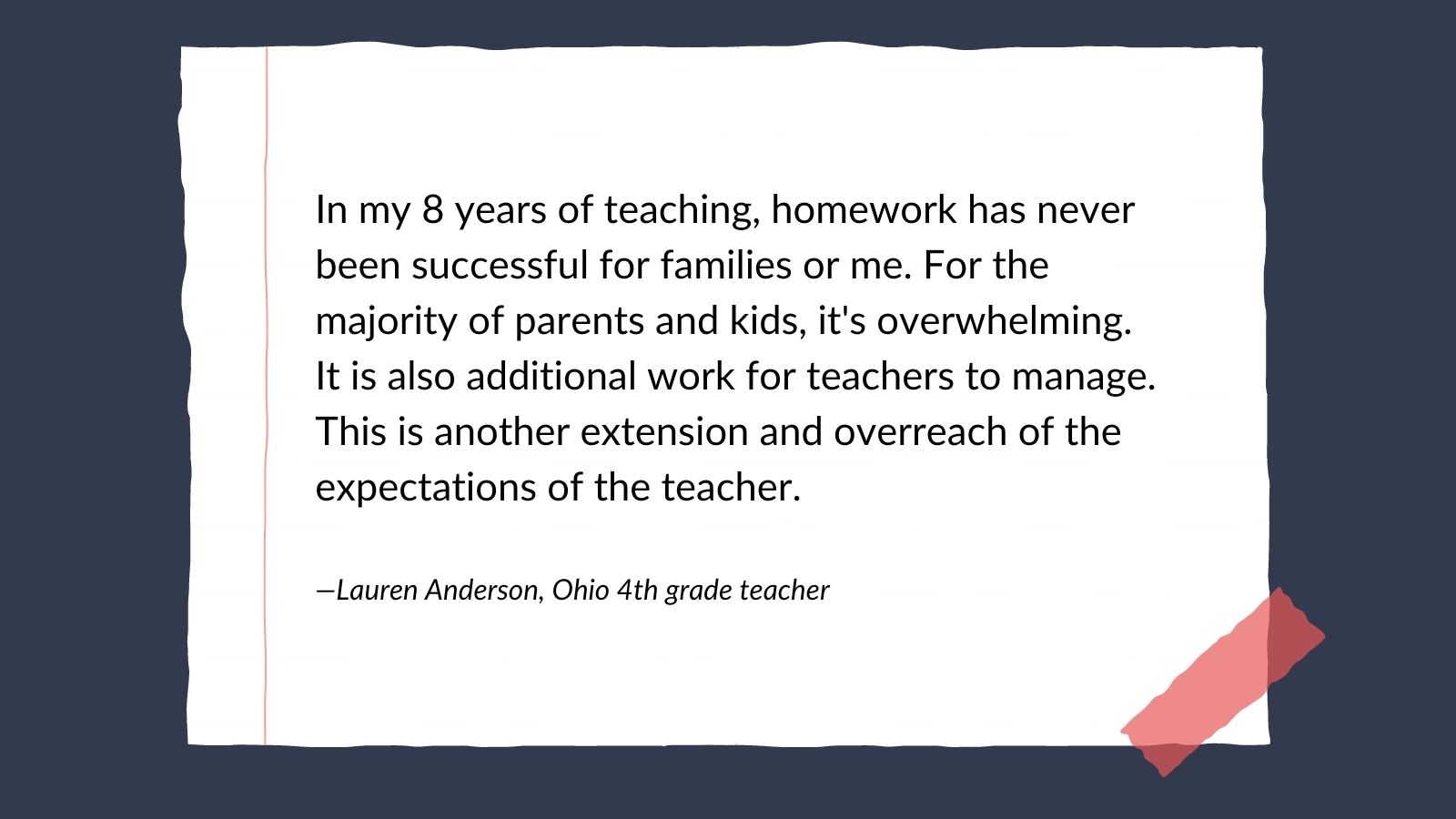
Every kid dreams of it: “Homework banned forevermore!” For as long as anyone can remember, homework has just been one of those things kids have to do because it’s good for them, like eating their vegetables. But is it really as important to do hours of homework every night as it is to eat broccoli and carrots? New research suggests homework might not have a whole lot of value. This leads to a big question: Should we ban homework?
“I think parents already have enough stress just in providing for their families!” says one Arizona 1st grade teacher. “I can imagine one more chore of having to sit down and do homework with their child would add that much more stress. Kids don’t like doing homework, so it frustrates them, which in turn frustrates parents. They spend time fighting about homework that they could be spending quality time over a board game or family meal!”
We wanted to know more, as every educator should. So, we combed through recent research to see what experts say, and explored the news to see what schools in the United States and abroad have tried. Plus, we asked 40+ active K-12 educators to share their thoughts. Here’s what we found out.
Does homework actually work?
This is one of the biggest questions people have around homework bans. Is it worth the time students are spending on it? How many kids actually do it consistently? How involved do parents need to be? In short: Does homework have value?
What the Research Says
Educators first started asking serious questions about homework more than 20 years ago, when an article that evaluated decades of research on homework suggested that it might not be as effective as we thought, at least in the lower grades . But other studies on homework indicate that students who do homework as assigned have higher academic outcomes overall, especially in grades 7 through 12.
What Real Educators Say
Most of the teachers that responded to our survey felt homework (especially for upper grades) does have at least some value. Many, though, were less concerned with academic benefits and more with developing general life skills like time management and responsibility.
- “For older students, reasonable homework that is preparation for class the next day helps students learn how to manage their time, meet deadlines, and take responsibility for their learning. I am a fan of flipped learning—students watch the lesson for homework and then use class time to ask questions, work together, work with their teacher, and do the work.” —Julie Mason, MS/HS English teacher
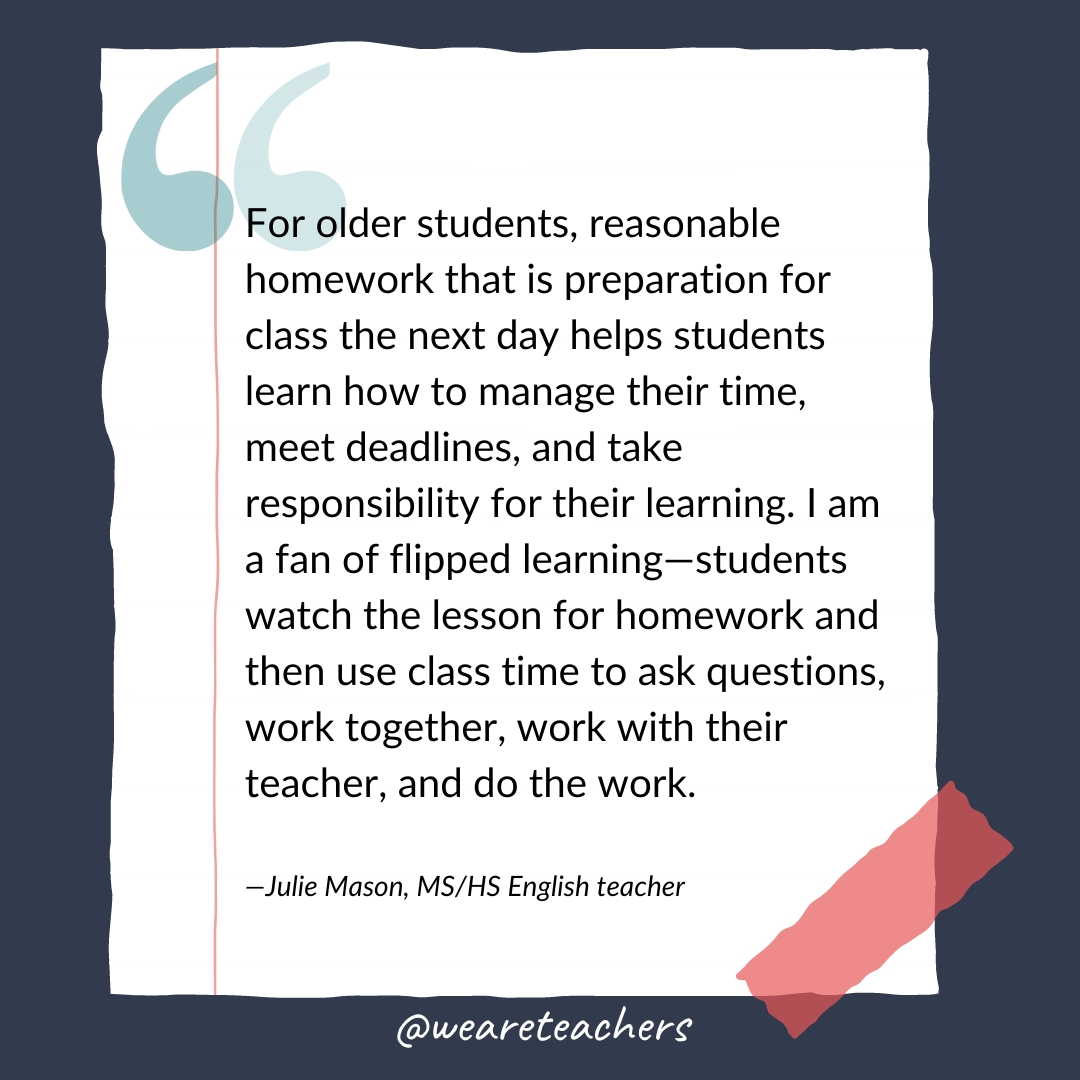
- “In middle school and high school, homework is important because it helps build stamina and potential study habits for college or trade schools.” —Desiree T., elementary teacher
- “Homework is good practice for subjects like math. In other subjects, it is good for reviewing subject matter.” —Ohio 8th grade social studies teacher
- “The proper amount of homework that is relevant to the daily lessons will help reinforce the skill and allow parents to see what their child is learning.” —Joanie B., Texas 4th/6th grade teacher
- “It’s not beneficial; parents today have not been taught how to help with new strategies. They are also often so busy that they cannot be bothered to help so they just give the answers. I saw a lot of this during the pandemic and even after when I would have 1st graders tell me they knew the answer ‘because they just know it.’ Not to mention the students who would actually benefit from having the extra practice of homework oftentimes do not have the support at home.” —Georgia 3rd grade teacher
- “In my 8 years of teaching, homework has never been successful for families or me. For the majority of parents and kids, it’s overwhelming. It is also additional work for teachers to manage. This is another extension and overreach of the expectations of the teacher.” —Lauren Anderson, Ohio 4th grade teacher
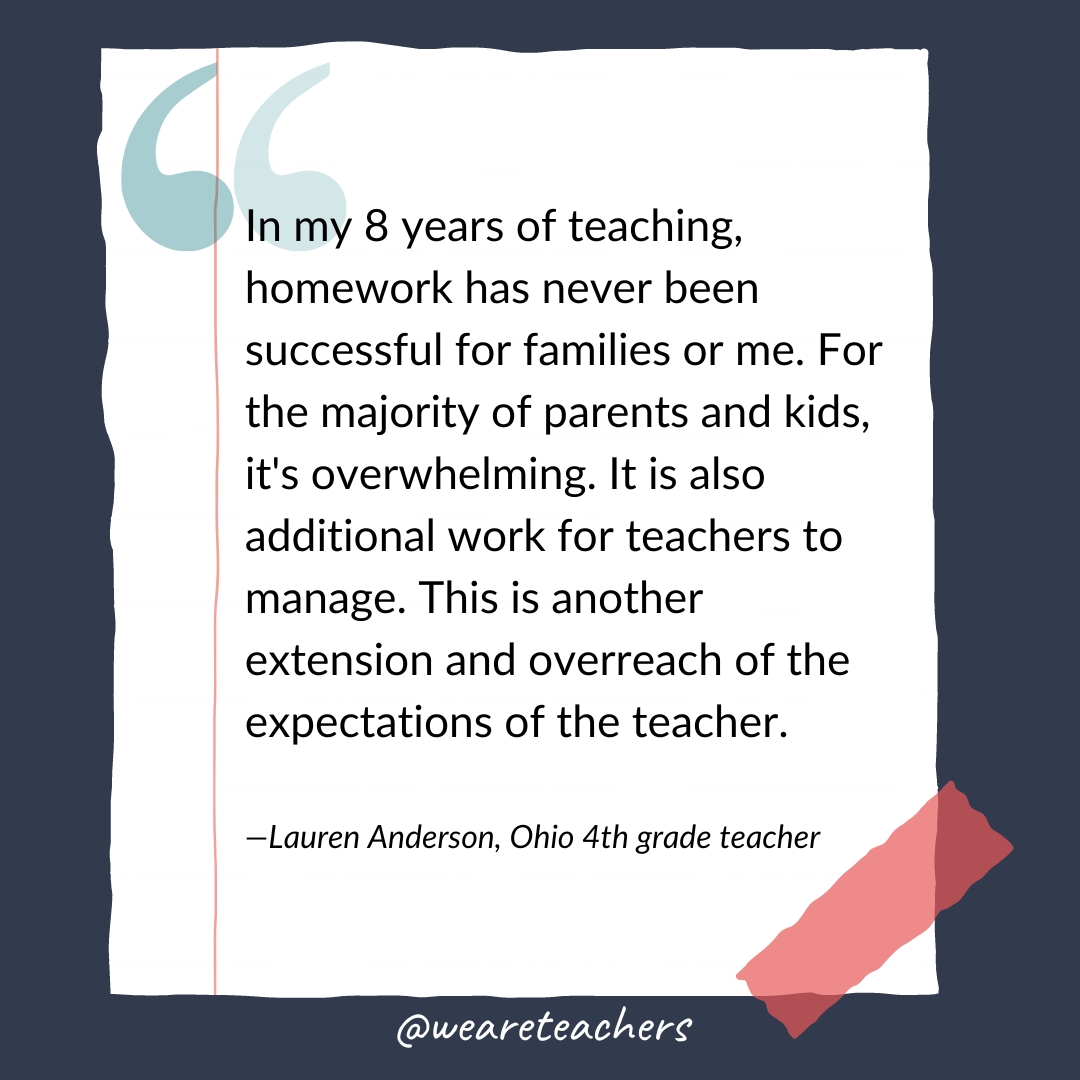
- “Homework isn’t busy work. How will today’s youth become tomorrow’s leaders (or survive college/trades classes) if they aren’t practicing skills to the next level?” —Arizona 1st grade teacher
Should we ban homework in elementary school?
Most adults today didn’t have homework in kindergarten, so they’re surprised when their child arrives home with a backpack full of worksheets. Older elementary students frequently bring home big projects like making a diorama or creating a family tree, something that usually means a lot of parent involvement. Is homework at this age reasonable and meaningful?
Supporters of a homework ban often cite research from John Hattie, who concluded that elementary school homework has no effect on academic progress. In a podcast he said, “Homework in primary school has an effect of around zero … It’s one of those lower hanging fruits that we should be looking in our primary schools to say, ‘Is it really making a difference?’”
The general wisdom these days seems to point to less homework overall at the elementary level, with one huge exception: reading. The research agrees: kids need to read at home as well as at school. Most educators recommend kids spend at least 20 minutes reading at home every single day.
More than half of our survey respondents (56%) are in favor of banning homework for the elementary grades. They worried about kids not having support or resources at home and taking away their time for creative play or family activities. But some teachers still find value in elementary homework, especially for math and reading, as long as it’s minimal. ADVERTISEMENT
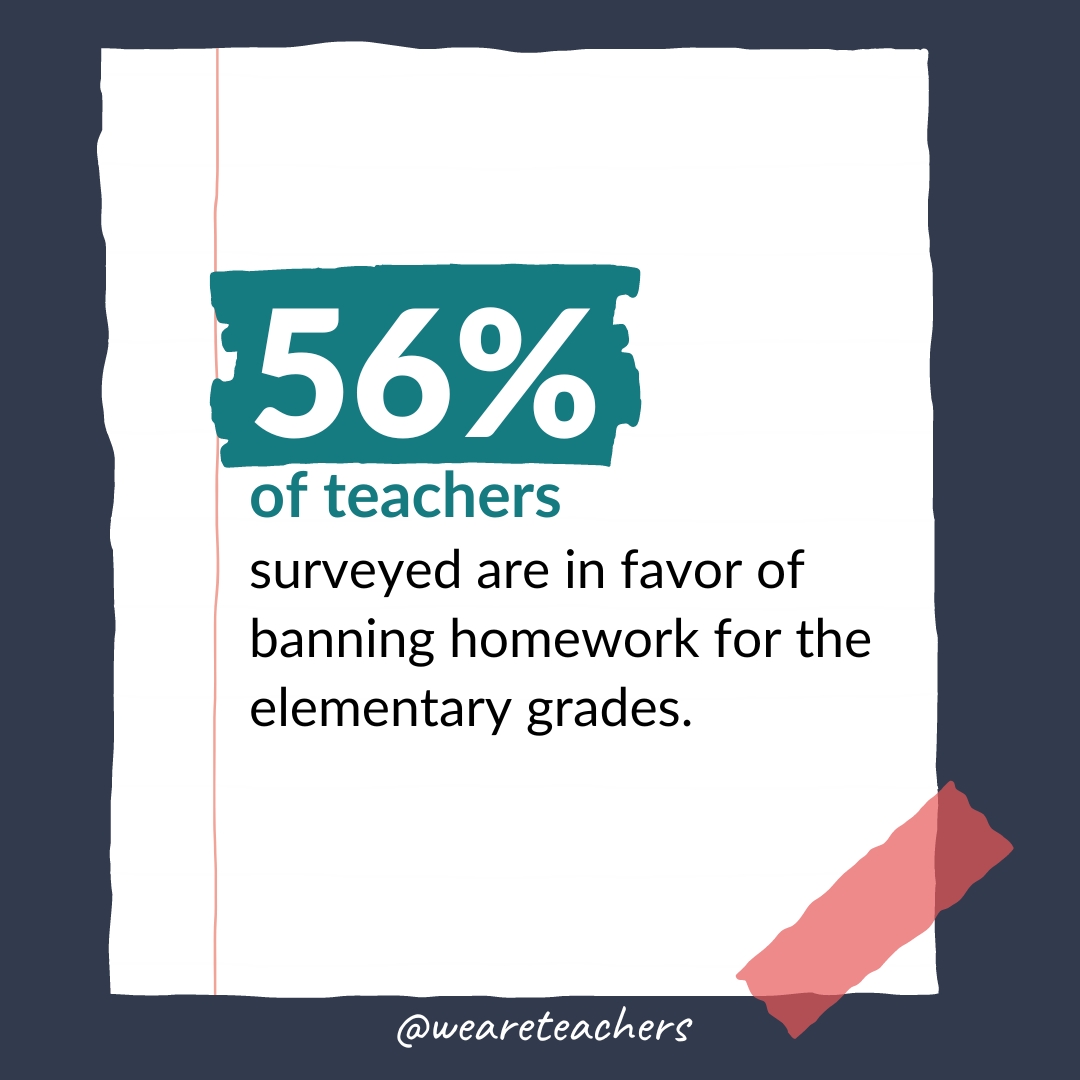
- “The common push for homework in elementary schools is ‘to prepare them for high school.’ That’s overreach. The elementary child’s job is to be an elementary child. We need to teach children where they are.” —Lauren Anderson
- “In elementary school, there should be a mixture of homework and unhomework activities. For example, a homework menu with a list of activities to complete for the month or for the week: Read in pajamas for 20 minutes, complete 3 math sheets, help cook dinner, have a family movie night, write your first and last name 10 times, help pack your snack, etc.” —Desiree T.
- “No homework should be part of the teacher motto—work smarter, not harder. Teachers spend too much time grading homework. I believe teachers and students should commit to making every minute count in the classroom so everyone can go home and just be with family.” —Jennifer N., 5th grade teacher
- “Students are learning new concepts. There is not a guarantee that someone will be able to help them with these tasks. Practicing incorrectly is worse than no practice at all.” —High school resource specialist
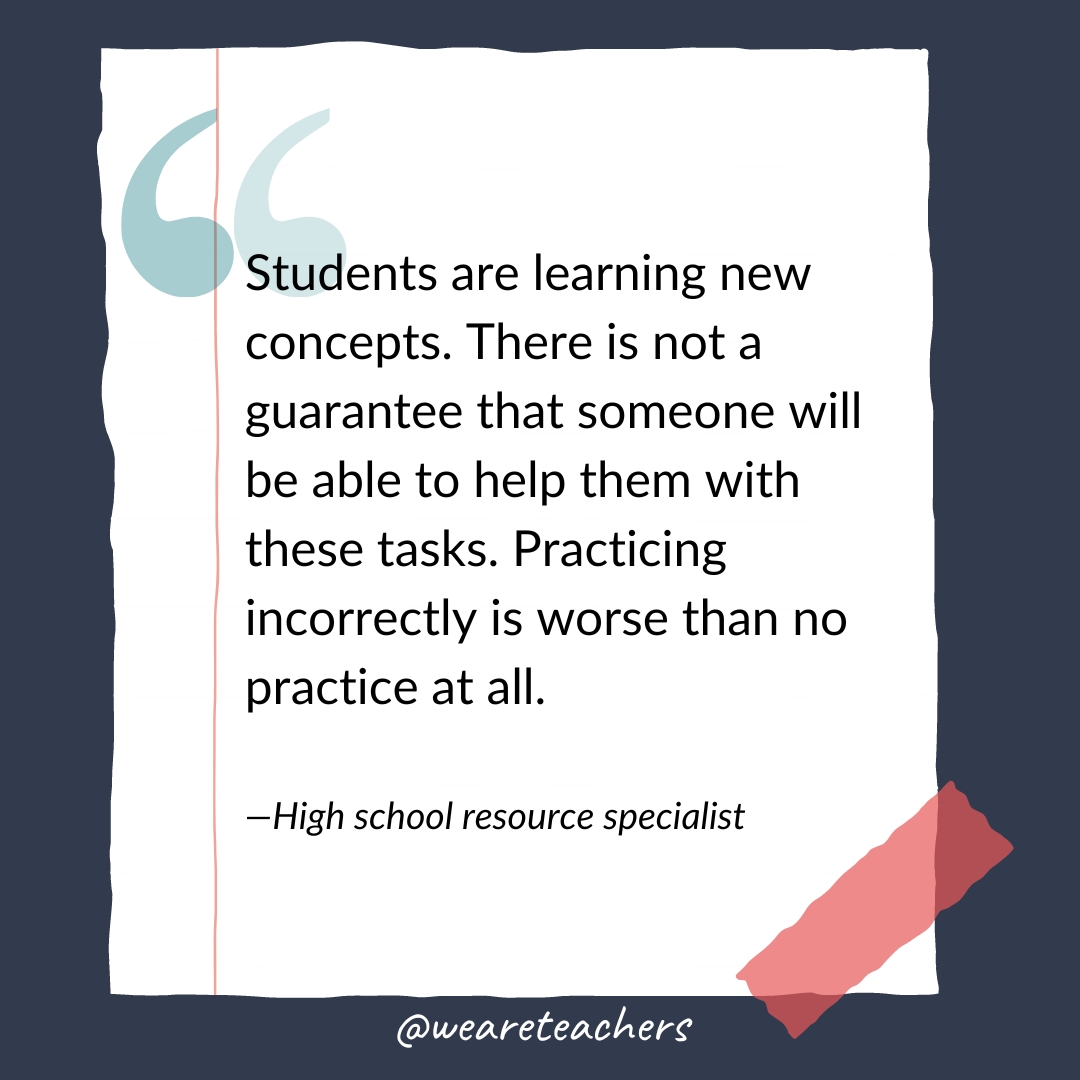
- “Kids should be encouraged to read [at home] and spend time with families and friends.” —Elementary English language development teacher
How much homework is enough (or too much)?
If we agree that that answer to “should we ban homework altogether” is “no,” then how much homework is reasonable? The answer seems to vary by grade level, as you would expect. But many point out the need to focus on the quality of homework over the quantity. And there have been increasing calls to let kids enjoy their longer school breaks without homework hanging over their heads .
A 2019 study showed that teenagers have doubled the amount of time they spend on homework since the 1990s. This study found that teens spend about an hour a day doing homework on average, which many would argue isn’t unreasonable. But in another study , kids self-reported doing an average of three hours of homework a night, which seems a lot more significant.
The National PTA and the NEA recommend kids do about 10 minutes of homework per night per grade level. In other words, a 3rd grader should do 30 minutes of homework. A 12th grader would do 120 minutes, or two full hours.
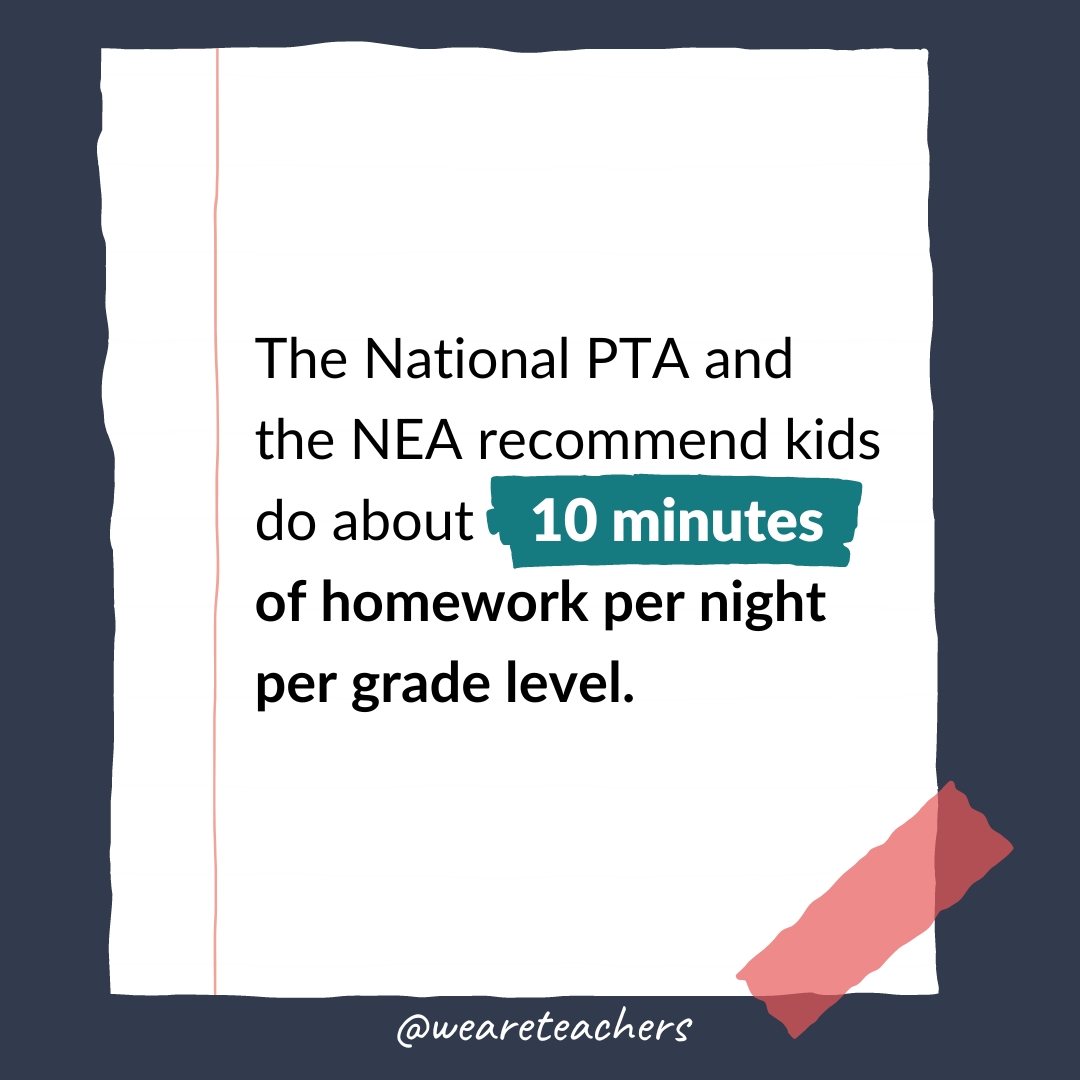
Perhaps more important than “How much homework?” is “What kind of homework?” Meaningful practice of what kids learned in class that day can be helpful. Busywork is not. And assigning really difficult work for kids to tackle at home, without any help from a teacher or other expert voice, is likely to simply frustrate them. Unfortunately, most teachers don’t receive training on how to assign homework that is meaningful and relevant to students. This is another area where we really need to consider a major culture shift.
While 75% of those surveyed say homework has some value in the upper grades at least, most feel it shouldn’t be excessive. Teachers stressed that it should never be used as punishment. Plus, it’s important to remember not all kids have the same access to help and resources outside the classroom.
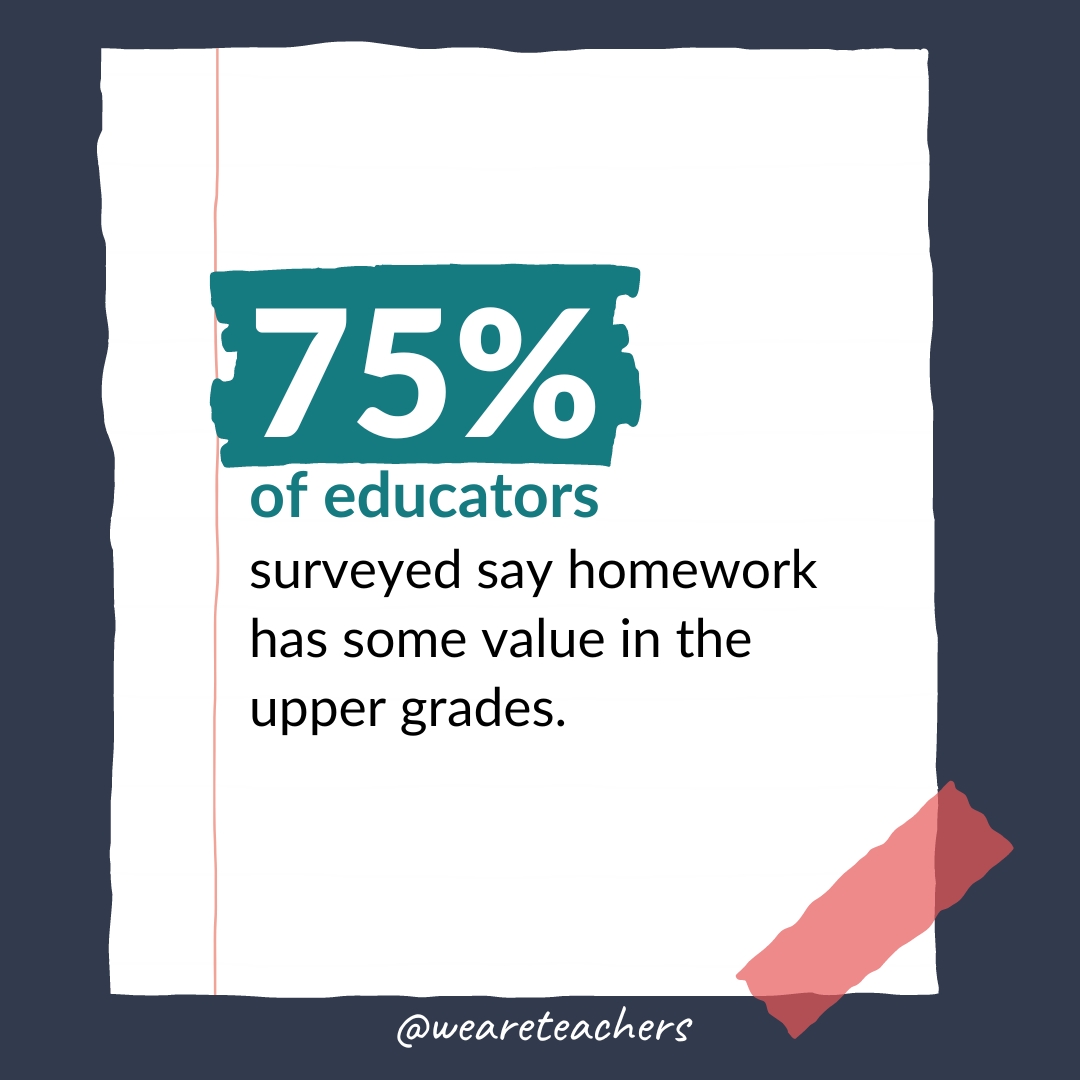
- “Homework is important but I also believe it shouldn’t exceed 30-60 minutes a night.” —Desiree T.
- “I do think elementary students should practice their reading and maybe 10 minutes of math [at home]. That may look different for each child due to how long it may take them to complete something.” —Wisconsin elementary special education teacher
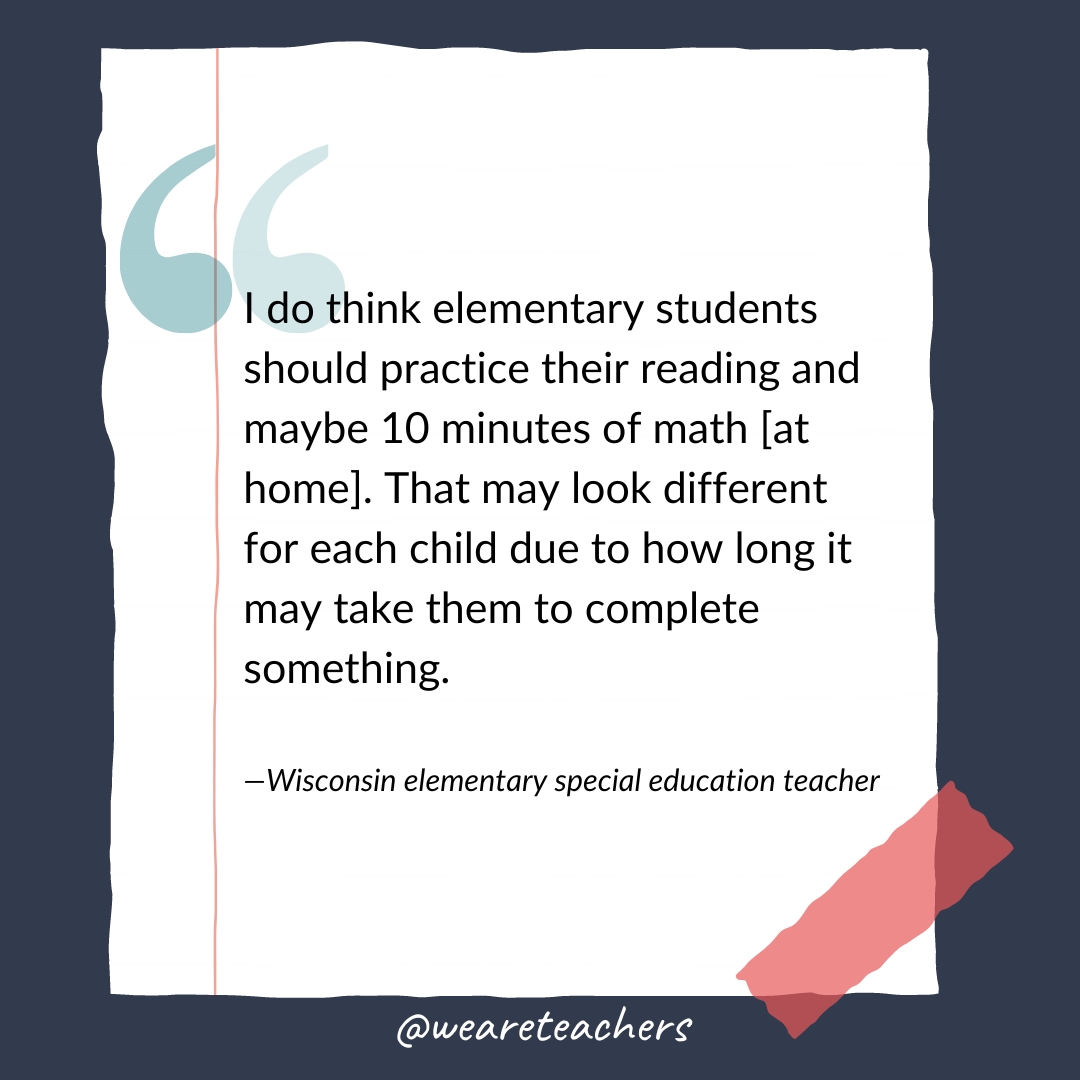
- “Elementary students are not too young to have homework once or twice a week. More than that would be too much.” —Tanya T., HS ELA teacher
- “In order to prepare students for high school, I feel 20-30 minutes of homework is okay [in elementary school].” —Florida 5th grade teacher
- “A ton of homework in every subject is ridiculous. But having to read parts of a book or an article and do several math problems should not be burdensome. And the benefit of those two things has been documented.” —Teresa Rennie, Pennsylvania 8th grade teacher
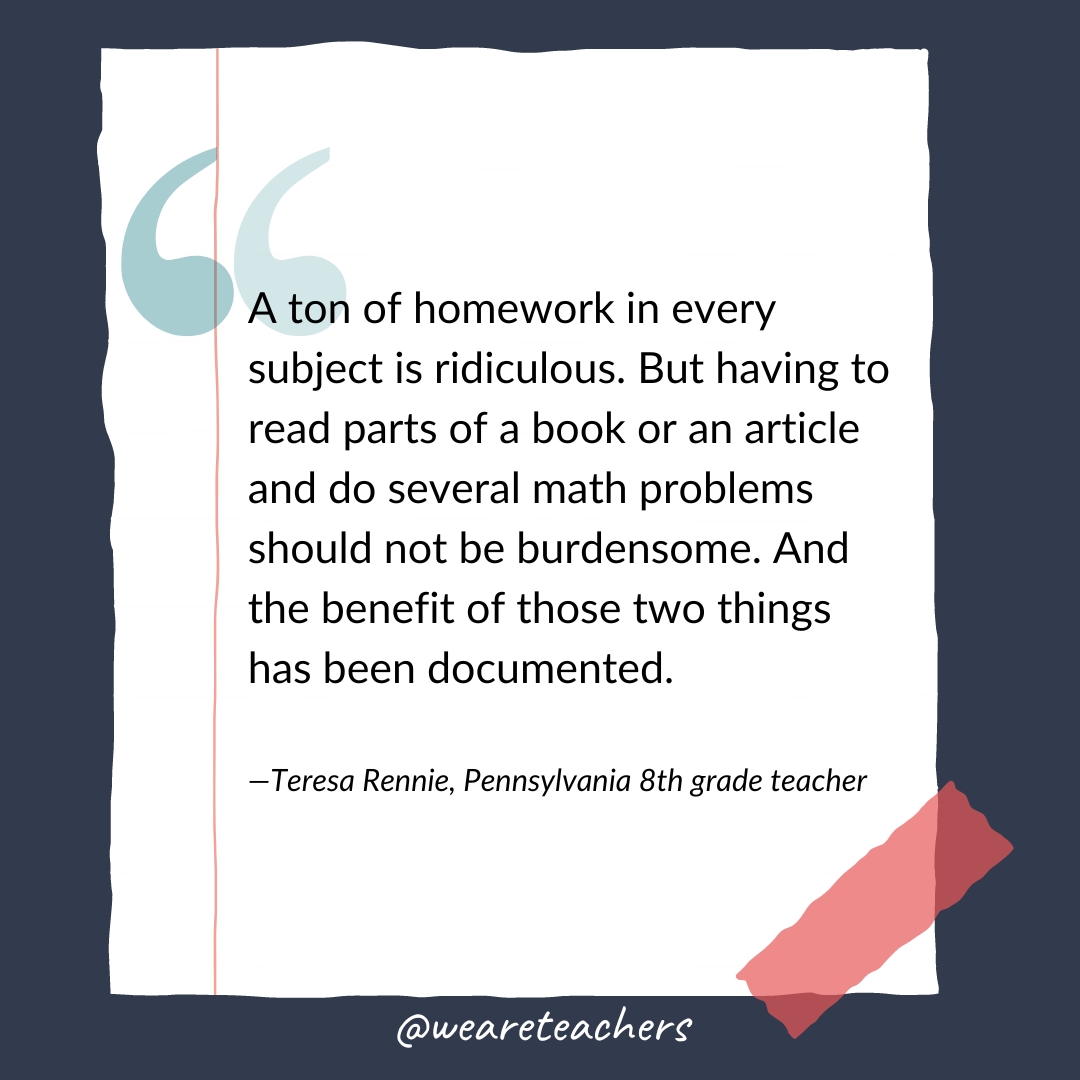
- “I encourage my elementary students to read a little every day to develop a love of reading.” —Meenal Parikh, Ohio 1st grade teacher
- “I think some homework is reasonable. Should it be a hindrance to other other activities or a major inconvenience? No. Some is good, but it doesn’t need to be an every-night thing.” —Patrick Danz, Michigan high school ELA teacher
Are there benefits to less (or no) homework?
Some schools have already banned homework, both in the United States and around the world. In April 2024, Poland enacted a homework ban for students in grades 1 through 3. In grades 4 through 8, homework must be optional and can’t count toward a student’s grade. Finnish schools are famous for assigning less homework at all ages , yet continuing to score highly in international rankings. So what are the benefits of freeing kids from homework?
Prioritizing mental health is at the forefront of the homework ban movement. Leaders say they want to give students time to develop other hobbies, relationships, and balance in their lives. When two Utah elementary schools officially banned homework , they found psychologist referrals for anxiety decreased by more than 50%.
In some cases, less or no homework can even have a positive effect on academic outcomes. One high school math teacher dramatically reduced the number of practice problems he asked his students to tackle at home. He also decreased the impact of homework on grades (from 25% to 1%). Now kids had more time to spend on just a few practice problems, and they weren’t stressed about getting them wrong. The result of changes like these? Higher standardized test scores on average.
Some schools have experimented with extending the school day in exchange for eliminating homework. This ensures that kids have more time to do independent work while also ensuring access to expert assistance. After all, not all parents have the time or ability to help with homework. And Internet access isn’t a given in every household. Keeping schoolwork at school means giving all kids equal access to the resources they need.
Teachers worry that kids who spend too much time doing homework are losing out in other areas. They want younger students to have more time to play. Older kids should be able to decompress after spending hours in the classroom. And everyone deserves more opportunities for family time and extracurriculars.
- “The stress and time surrounding homework is unnecessary. Jobs don’t require you take work home so school shouldn’t either. If a kid needs to work more, school could reach out with extra help, but homework is a waste of time. Home is for family time.” —Stephanie G., Maryland 1st grade teacher
- “Homework creates an equity problem. Not all learners have access to the same environment or supports at home as they do in school. The students who have supportive parents and resources (tutors, etc.) will succeed, while others will be penalized.” —Illinois high school teacher
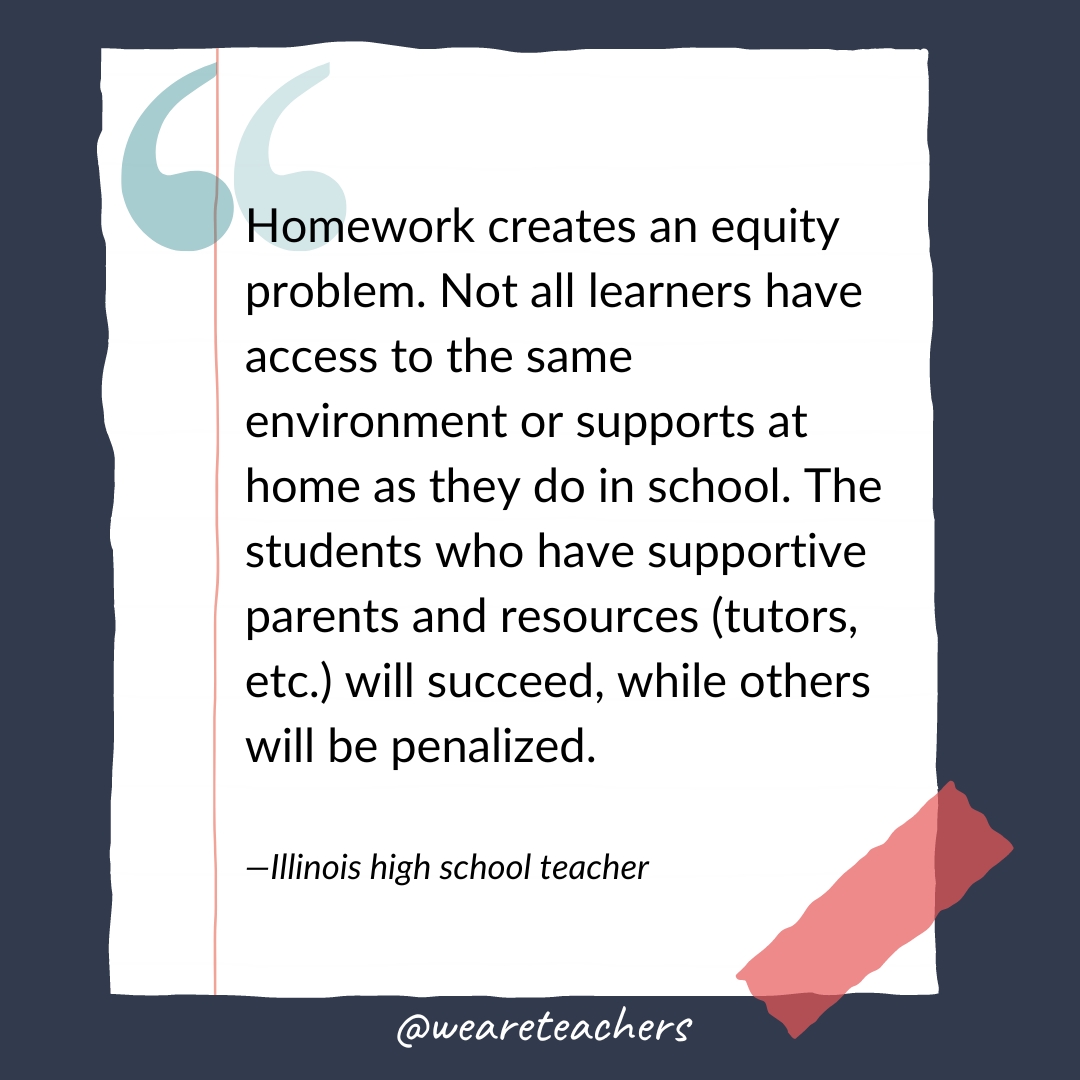
- “If they work at school, they don’t need to work at home. We’re teaching them that it’s okay for someone to tell them how to spend their off-time. School is their job. I don’t like working for free; why should they think that it’s okay?” —North Carolina 1st grade teacher
- “After-school programs, sports, and unstructured play is MUCH more meaningful and impactful for these generations of students.” —Lauren Anderson
- “There are other ways to teach children responsibility and time management than completing homework that will most likely be ungraded.” —4th grade social studies teacher
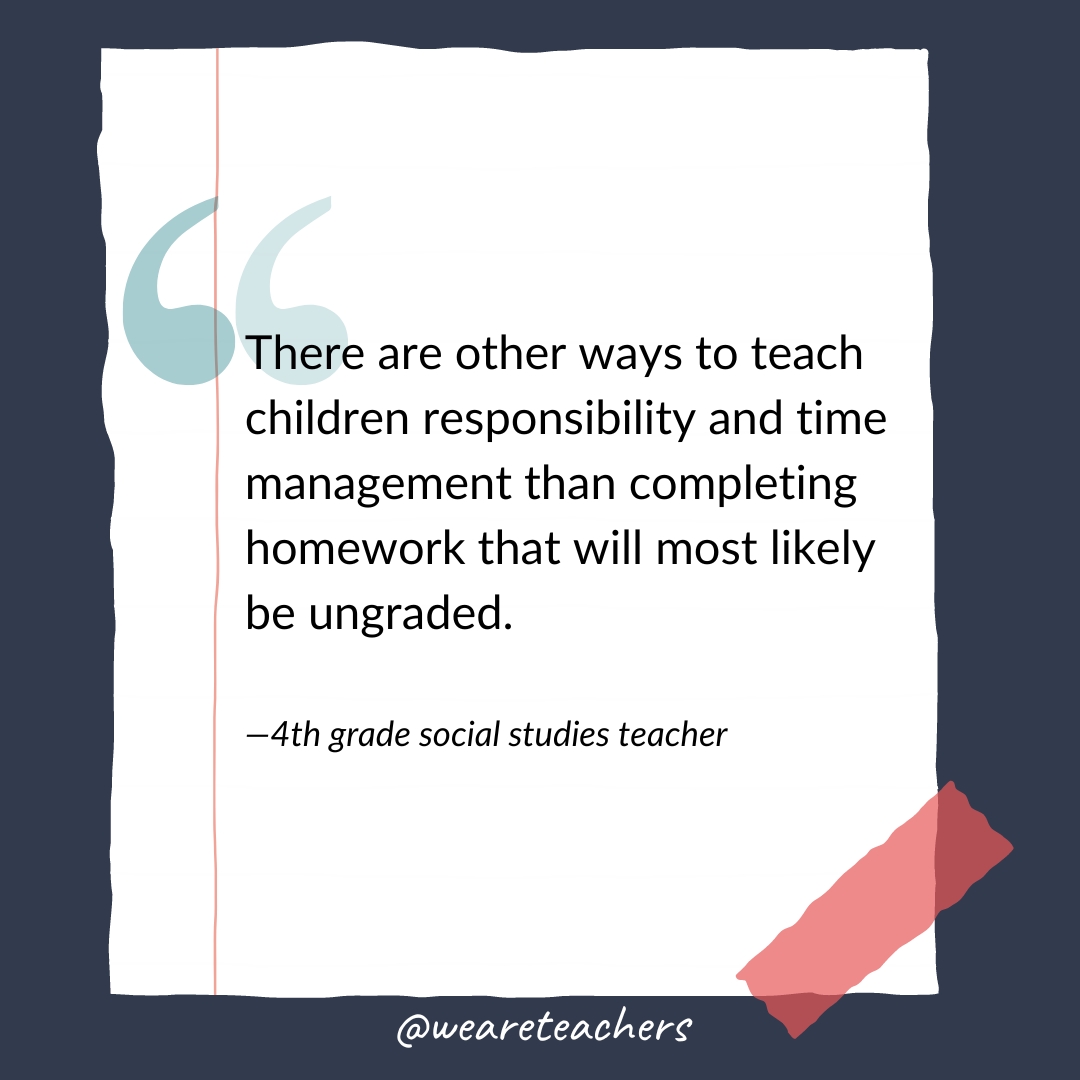
One Teacher’s Take on the Value of Homework: More Cons Than Pros
One 4th grade social studies teacher from North Carolina shared their thoughts with us in detail. We felt they were worth sharing with a wider audience. (Note: We’ve edited and condensed their words for space and clarity.)
Homework Hurts Families
“There are multiple factors that work together that make homework detrimental to students and their families. Children need to spend time with their parents building relationships of trust and respect. It is difficult because during the limited time families have together, they are forced by the schools to give that up to deal with homework.
“Many parents are unable to answer homework questions to help their children as methodology has changed and evolved. Homework becomes a stressful battlefield. Children with ADHD, autism, and other challenges have such a difficult time keeping focus at school. When they have to do additional work at home, there are increased meltdowns and battles, putting further strains on families.”
Homework’s Time Cost
“Children also have less time to complete work at home due to how overscheduled families have become. Children as young as 3rd grade arrive home from their games as late as 10:00 at night. That is often their first opportunity to sit down to complete their work. When they come to school the next day, they become irritable, unfocused, frustrated, and unable to quickly grasp new material.
“In older grades, teachers don’t plan together and don’t understand how much is required of the student to complete each night. If a high school student has six classes and each teacher assigns only 30 minutes of homework each night, that adds up to three hours. I hear of many teachers that each give an hour each night. I don’t see how it is possible for a high school student to complete six hours of homework every night.
“The additional stress of homework for the teacher, students, and families is not worth it. Give families time to spend together, and free up teacher time by not having to hunt down missing work and reviewing what they are not grading. Allow children to have a better bedtime and avoid meltdowns at home, which lead to additional stress, anxiety, and depression.”
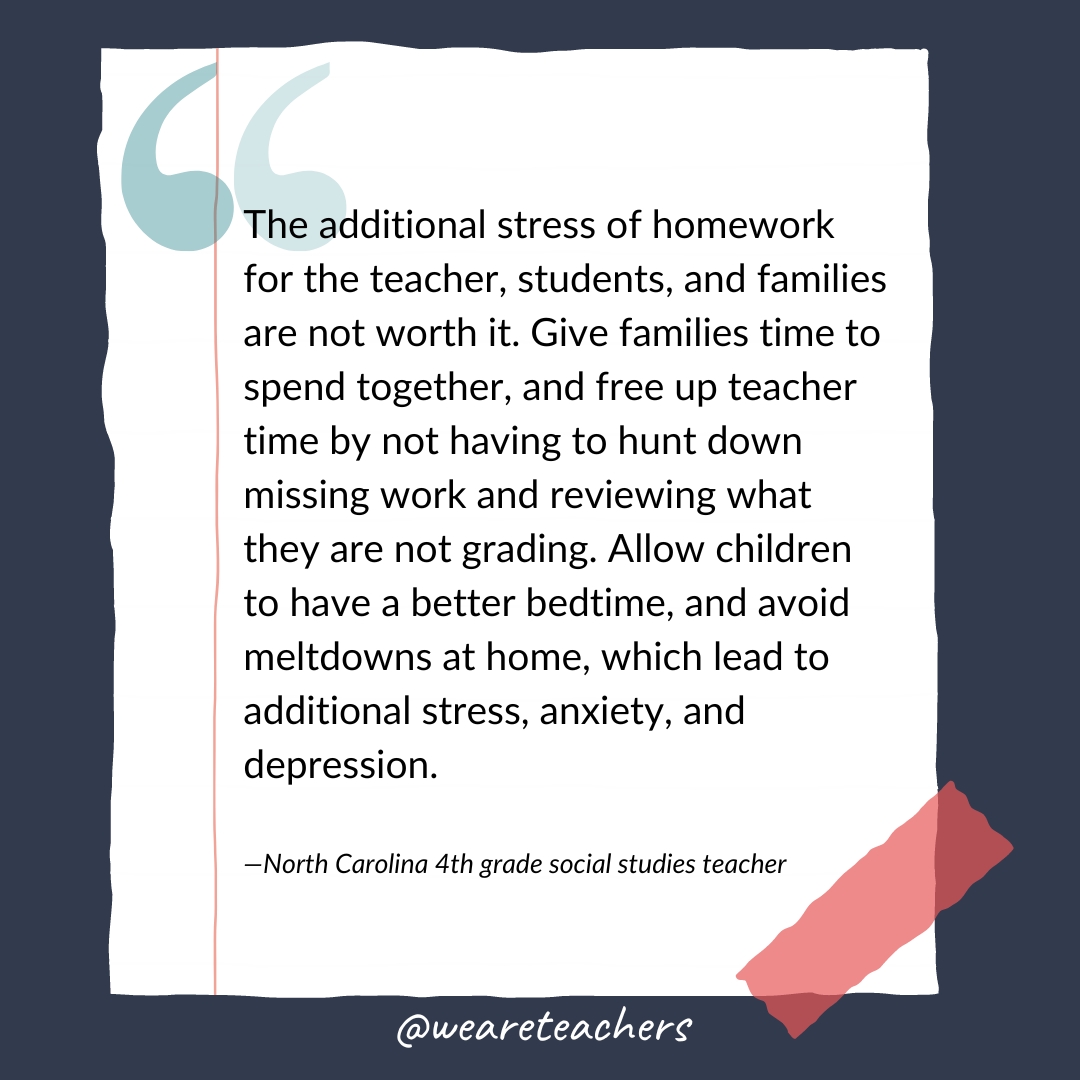
We’d love to hear your thoughts—should homework be banned? Join the discussion in the We Are Teachers HELPLINE group on Facebook.

You Might Also Like

As a Teacher, I Wasn’t Prepared for THIS Kind of Parent Meeting
What did I have to say to the parents of my straight-A students? Continue Reading
Copyright © 2024. All rights reserved. 5335 Gate Parkway, Jacksonville, FL 32256
Why I Think All Schools Should Abolish Homework

H ow long is your child’s workweek? Thirty hours? Forty? Would it surprise you to learn that some elementary school kids have workweeks comparable to adults’ schedules? For most children, mandatory homework assignments push their workweek far beyond the school day and deep into what any other laborers would consider overtime. Even without sports or music or other school-sponsored extracurriculars, the daily homework slog keeps many students on the clock as long as lawyers, teachers, medical residents, truck drivers and other overworked adults. Is it any wonder that,deprived of the labor protections that we provide adults, our kids are suffering an epidemic of disengagement, anxiety and depression ?
With my youngest child just months away from finishing high school, I’m remembering all the needless misery and missed opportunities all three of my kids suffered because of their endless assignments. When my daughters were in middle school, I would urge them into bed before midnight and then find them clandestinely studying under the covers with a flashlight. We cut back on their activities but still found ourselves stuck in a system on overdrive, returning home from hectic days at 6 p.m. only to face hours more of homework. Now, even as a senior with a moderate course load, my son, Zak, has spent many weekends studying, finding little time for the exercise and fresh air essential to his well-being. Week after week, and without any extracurriculars, Zak logs a lot more than the 40 hours adults traditionally work each week — and with no recognition from his “bosses” that it’s too much. I can’t count the number of shared evenings, weekend outings and dinners that our family has missed and will never get back.
How much after-school time should our schools really own?
In the midst of the madness last fall, Zak said to me, “I feel like I’m working towards my death. The constant demands on my time since 5th grade are just going to continue through graduation, into college, and then into my job. It’s like I’m on an endless treadmill with no time for living.”
My spirit crumbled along with his.
Like Zak, many people are now questioning the point of putting so much demand on children and teens that they become thinly stretched and overworked. Studies have long shown that there is no academic benefit to high school homework that consumes more than a modest number of hours each week. In a study of high schoolers conducted by the Organization for Economic Cooperation and Development (OECD), researchers concluded that “after around four hours of homework per week, the additional time invested in homework has a negligible impact on performance.”
In elementary school, where we often assign overtime even to the youngest children, studies have shown there’s no academic benefit to any amount of homework at all.
Our unquestioned acceptance of homework also flies in the face of all we know about human health, brain function and learning. Brain scientists know that rest and exercise are essential to good health and real learning . Even top adult professionals in specialized fields take care to limit their work to concentrated periods of focus. A landmark study of how humans develop expertise found that elite musicians, scientists and athletes do their most productive work only about four hours per day .
Yet we continue to overwork our children, depriving them of the chance to cultivate health and learn deeply, burdening them with an imbalance of sedentary, academic tasks. American high school students , in fact, do more homework each week than their peers in the average country in the OECD, a 2014 report found.
It’s time for an uprising.
Already, small rebellions are starting. High schools in Ridgewood, N.J. , and Fairfax County, Va., among others, have banned homework over school breaks. The entire second grade at Taylor Elementary School in Arlington, Va., abolished homework this academic year. Burton Valley Elementary School in Lafayette, Calif., has eliminated homework in grades K through 4. Henry West Laboratory School , a public K-8 school in Coral Gables, Fla., eliminated mandatory, graded homework for optional assignments. One Lexington, Mass., elementary school is piloting a homework-free year, replacing it with reading for pleasure.
More from TIME
Across the Atlantic, students in Spain launched a national strike against excessive assignments in November. And a second-grade teacher in Texas, made headlines this fall when she quit sending home extra work , instead urging families to “spend your evenings doing things that are proven to correlate with student success. Eat dinner as a family, read together, play outside and get your child to bed early.”
It is time that we call loudly for a clear and simple change: a workweek limit for children, counting time on the clock before and after the final bell. Why should schools extend their authority far beyond the boundaries of campus, dictating activities in our homes in the hours that belong to families? An all-out ban on after-school assignments would be optimal. Short of that, we can at least sensibly agree on a cap limiting kids to a 40-hour workweek — and fewer hours for younger children.
Resistance even to this reasonable limit will be rife. Mike Miller, an English teacher at Thomas Jefferson High School for Science and Technology in Alexandria, Va., found this out firsthand when he spearheaded a homework committee to rethink the usual approach. He had read the education research and found a forgotten policy on the county books limiting homework to two hours a night, total, including all classes. “I thought it would be a slam dunk” to put the two-hour cap firmly in place, Miller said.
But immediately, people started balking. “There was a lot of fear in the community,” Miller said. “It’s like jumping off a high dive with your kids’ future. If we reduce homework to two hours or less, is my kid really going to be okay?” In the end, the committee only agreed to a homework ban over school breaks.
Miller’s response is a great model for us all. He decided to limit assignments in his own class to 20 minutes a night (the most allowed for a student with six classes to hit the two-hour max). His students didn’t suddenly fail. Their test scores remained stable. And they started using their more breathable schedule to do more creative, thoughtful work.
That’s the way we will get to a sane work schedule for kids: by simultaneously pursuing changes big and small. Even as we collaboratively press for policy changes at the district or individual school level, all teachers can act now, as individuals, to ease the strain on overworked kids.
As parents and students, we can also organize to make homework the exception rather than the rule. We can insist that every family, teacher and student be allowed to opt out of assignments without penalty to make room for important activities, and we can seek changes that shift practice exercises and assignments into the actual school day.
We’ll know our work is done only when Zak and every other child can clock out, eat dinner, sleep well and stay healthy — the very things needed to engage and learn deeply. That’s the basic standard the law applies to working adults. Let’s do the same for our kids.
Vicki Abeles is the author of the bestseller Beyond Measure: Rescuing an Overscheduled, Overtested, Underestimated Generation, and director and producer of the documentaries “ Race to Nowhere ” and “ Beyond Measure. ”
More Must-Reads from TIME
- How the Electoral College Actually Works
- Your Vote Is Safe
- Mel Robbins Will Make You Do It
- Why Vinegar Is So Good for You
- The Surprising Health Benefits of Pain
- You Don’t Have to Dread the End of Daylight Saving
- The 20 Best Halloween TV Episodes of All Time
- Meet TIME's Newest Class of Next Generation Leaders
Contact us at [email protected]

IMAGES
VIDEO
COMMENTS
Proponents say homework improves student achievement. Opponents say too much homework is harmful to students. Explore both sides of the debate.
Although banning homework might seem like an unorthodox process, there are legitimate advantages to consider with this effort. There are some disadvantages which some families may encounter as well. These are the updated lists of the pros and cons of banning homework to review.
The homework debate has strong arguments on both sides. Commonly-cited reasons why homework should be banned include the idea that it is often counterproductive, stifles students’ creativity, and limits their freedom outside the classroom.
There are several advantages and disadvantages of why homework should be banned from the current school structure. List of the Advantages of Why Homework Should Be Banned 1. Homework creates a longer day for students than what parents work.
Homework can indeed produce academic benefits, such as increased understanding and retention of the material, says Duke University social psychologist Harris Cooper, PhD, one of the nation's leading homework researchers. But not all students benefit.
Mindfulness surrounding homework is especially important in the context of the last two years. Many students will be struggling with mental health issues that were brought on or worsened by the...
Is homework, including the projects and writing assignments you do at home, an important part of your learning experience? Or, in your opinion, is it not a good use of time? Explain.
So what are the benefits of freeing kids from homework? What the Research Says. Prioritizing mental health is at the forefront of the homework ban movement. Leaders say they want to give students time to develop other hobbies, relationships, and balance in their lives.
Studies have long shown that there is no academic benefit to high school homework that consumes more than a modest number of hours each week.
1. Homework Fosters Study Skills and Independent Learning. Proponents of keeping homework in schools say that the practice is about more than just reviewing academic content; it also...